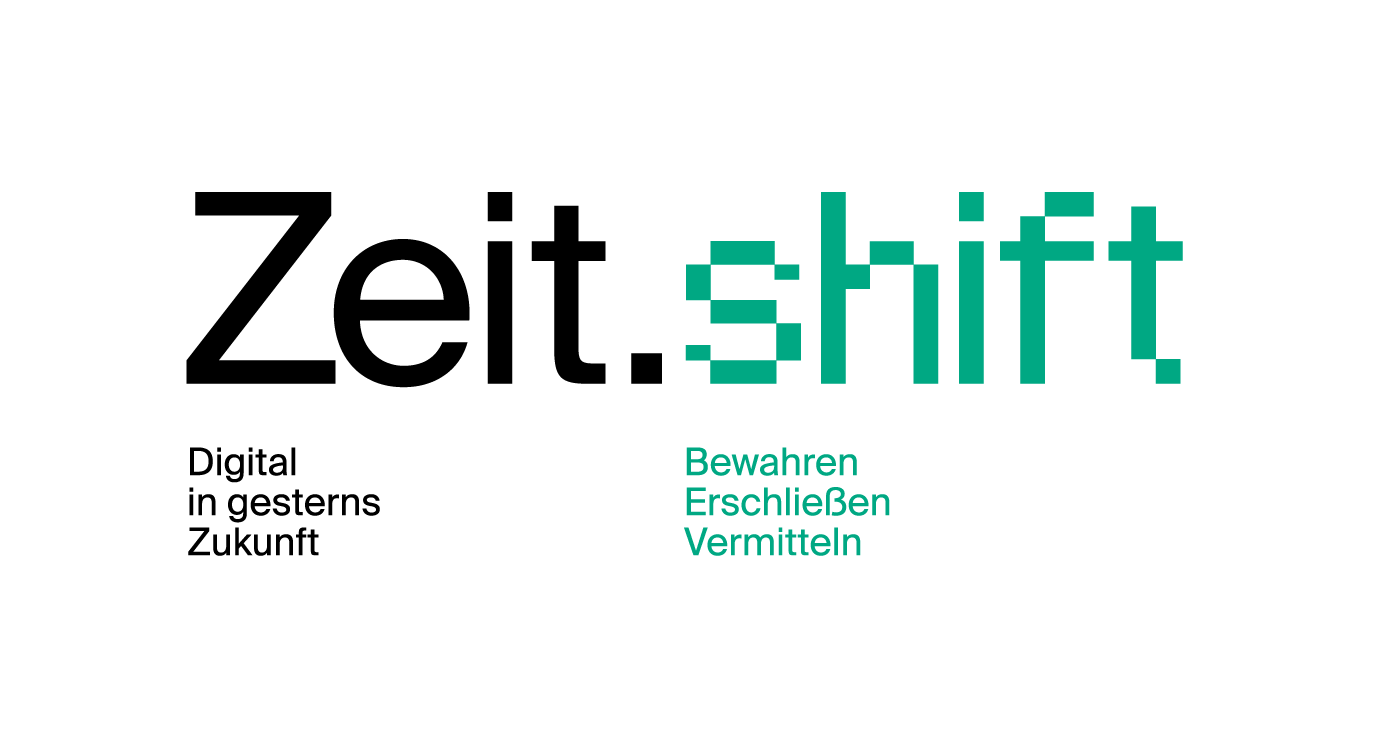
Zeit.shift
Offers active beyond the duration of Zeit.shift
The Zeit.shift project ended in June 2023. The central web offerings continue to be active beyond the project duration. Specifically, the results can be followed via the website. The newly generated web portal is accessible worldwide and the text material provided (several million newspaper pages) is searchable and downloadable. Geodata and content tags can be assigned via an external platform and the online game Ötzit! is freely available. However, an evaluation of the generated data, as formulated in the project description, no longer takes place after the end of the project.
What is the Zeit.shift project about?
The aim of the Zeit.shift project is to establish a long-term, cross-border cooperation for the preservation, development and dissemination of the cultural text heritage of Tyrol and South Tyrol from the late 19th and early 20th centuries. Using historical newspapers as a prototype, the text collections are to be preserved in the long term and made accessible to the general public in a web portal. This offers the opportunity to learn more about one's own cultural heritage and to learn to appreciate historical texts as a source for exciting discoveries. An important focus of the project is the active involvement of the population. Interested citizens are invited to participate and can contribute to the text indexing by annotating the text material online. Together with citizens, relevant key terms and the correct location of the text excerpts will be added in order to improve the usability and searchability of the historical text material.
How can one participate?
Via the Historypin platform, interested citizens can participate in text indexing by describing the content of advertisements in historical daily newspapers and geolocating them via Google Maps in order to virtually reconstruct the shopping streets of 100 years ago. In this way, one can gain an insight into which products were traded and which events took place in yesterday’s world. One discovers professions and trades, some of which no longer exist, and has the opportunity to draw one's own comparisons of what can be found in the places mentioned today. This is only a small excerpt of the variety of topics offered by the advertisements in the press of that time - a voyage of discovery into the world of our ancestors. Participation is not tied to a specific time or place; all you need is internet access and a computer or smartphone. Tutorials will help with questions, and there is also the possibility of contacting the Zeit.shift project staff directly (This email address is being protected from spambots. You need JavaScript enabled to view it.). The citizen science activities are aimed at all citizens and no special knowledge is necessary to participate in the project.
Another citizen science approach in the Zeit.shift project was developed with the gamification application Ötzit!. The online game Ötzit! is about saving Ötzi from dangerous animals by correctly typing out falling words in Fraktur script. A game against time! Ötzit! is primarily aimed at German-speaking pupils aged 11-14, but is open to anyone interested. The aim of the game is to create an awareness of the digitised newspaper collections and to practise reading historical documents in Fraktur script. All data anonymously provided by the players (e.g. typed words) was analysed and used to explore automated OCR corrections via crowdsourcing and to improve the searchability of the digitised collections.
Why is it important and what happens to the data?
The benefit for the citizens is to experience the newspapers as a historical source and to learn something about their own cultural heritage through them. Together with the project team, they discover hidden archival treasures, thus making an invaluable contribution to indexing. In the project, the Zeit.shift portal for archiving, managing, researching and presenting digitised historical daily newspapers of the Tyrolean region was implemented. Using search filters, such as place and family names, time period, etc., the search results can be narrowed down precisely and the search term appears in the full text highlighted in colour. The data generated by the Citizen Science activities serve as support for the computer-linguistic analysis (e.g. correction of recognition errors in digitised texts in Fraktur script).
Photo gallery
-
 Unterinntaler Bote, 03.01.1908, S. 6 Unterinntaler Bote, 03.01.1908, S. 6
Unterinntaler Bote, 03.01.1908, S. 6 Unterinntaler Bote, 03.01.1908, S. 6 -
 Schwazer Lokal-Anzeiger, 16.04.1927, S. 4 Schwazer Lokal-Anzeiger, 16.04.1927, S. 4
Schwazer Lokal-Anzeiger, 16.04.1927, S. 4 Schwazer Lokal-Anzeiger, 16.04.1927, S. 4 -
 Unterinntaler Bote, 03.01.1908, S. 6 Unterinntaler Bote, 03.01.1908, S. 6
Unterinntaler Bote, 03.01.1908, S. 6 Unterinntaler Bote, 03.01.1908, S. 6 -
 Reuttener Nachrichten, 04.07.1930, S. 3 Reuttener Nachrichten, 04.07.1930, S. 3
Reuttener Nachrichten, 04.07.1930, S. 3 Reuttener Nachrichten, 04.07.1930, S. 3 -
 Unterinntaler Bote, 03.01.1908, S. 8 Unterinntaler Bote, 03.01.1908, S. 8
Unterinntaler Bote, 03.01.1908, S. 8 Unterinntaler Bote, 03.01.1908, S. 8 -
 Unterinntaler Bote, 03.01.1908, S. 10 Unterinntaler Bote, 03.01.1908, S. 10
Unterinntaler Bote, 03.01.1908, S. 10 Unterinntaler Bote, 03.01.1908, S. 10 -
 Unterinntaler Bote, 03.01.1908, S. 7 Unterinntaler Bote, 03.01.1908, S. 7
Unterinntaler Bote, 03.01.1908, S. 7 Unterinntaler Bote, 03.01.1908, S. 7 -
 Reuttener Nachrichten, 27.06.1930, S. 4 Reuttener Nachrichten, 27.06.1930, S. 4
Reuttener Nachrichten, 27.06.1930, S. 4 Reuttener Nachrichten, 27.06.1930, S. 4 -
 Schwazer Lokal-Anzeiger, 16.04.1927, S. 4 Schwazer Lokal-Anzeiger, 16.04.1927, S. 4
Schwazer Lokal-Anzeiger, 16.04.1927, S. 4 Schwazer Lokal-Anzeiger, 16.04.1927, S. 4 -
 Reuttener Nachrichten, 01.02.1929, S. 4 Reuttener Nachrichten, 01.02.1929, S. 4
Reuttener Nachrichten, 01.02.1929, S. 4 Reuttener Nachrichten, 01.02.1929, S. 4
https://www.citizen-science.at/en/projects/project-archive/zeit-shift-817#sigProId4ff201727f
Video

This project fulfilled version 1.1 of the quality criteria for citizen science projects on Österreich forscht.
- history
- language
- culture
- media

